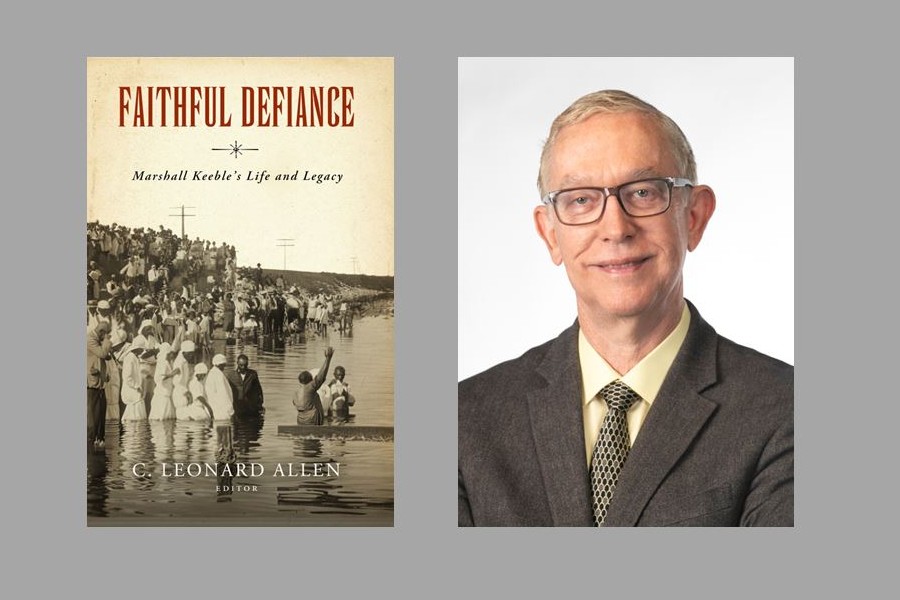Bible Dean explores life of evangelist Marshall Keeble
Leonard Allen’s new book shows how Keeble’s life continues to challenge and inform how we live today.
From Staff Reports |

This month, Lipscomb’s Dean of the College of Bible and Ministry Leonard Allen has released a new book depicting the life of Marshall Keeble, considered one of the premier evangelists in the Churches of Christ in the twentieth century.
Faithful Defiance: Marshall Keeble’s Life and Legacy will be available for purchase as of April 8. The book reexamines Keeble’s remarkable and impactful life, viewing it from the perspective of the years since his death in 1968.
In addition to Allen, Lipscomb’s Dean of the College of Liberal Arts & Sciences David Holmes contributed a chapter titled “The Rise and Role of the Black Preacher in America,” and long-time Bible faculty and author John Mark Hicks contributed the chapter titled “The Early Years.”
Allen was inspired to write the book after the 2023 Carroll Ellis Symposium, Lipscomb’s annual lecture on Biblical and church topics, which honored Keeble’s life and work in that year. The symposium brought Bible scholars, students, ministers and “grandsons” of Marshall Keeble to campus to explore the life and ministry of the premier evangelist.
Allen’s study of Keeble's life and legacy, published by Abilene Christian University Press, will be provided to attendees of the 2025 Carroll Ellis Symposium, taking place at Hillsboro Church of Christ in Nashville, also on April 8, and an anonymous patron has purchased 1,000 copies of the book to distribute to selected African American Churches of Christ.

Marshall Keeble
Keeble spent 55 years as a full-time evangelist. His remarkable gifts, steadfastness, toughness and tactical navigation of the Black/White divide enabled him to baptize as many as 40,000 people, to plant more than 300 congregations and to raise up and mentor powerful sons and grandsons in the faith, said Allen.
“Keeble was more complicated than many have thought,” said Allen, who has authored or co-authored 16 books on faith topics. “He did not openly defy segregation; but he was tough and defiant in his own way. He defied many pressures mounted against him, including innumerable racist attacks and humiliations. Evangelism was his calling, and he wanted nothing to get in the way of it. But he believed in the concept of racial self-help, which impacted many of his preacher students like Fred Gray, the famous civil rights attorney.”
Gray attended the 2023 Carroll Ellis Symposium to speak on his relationship with Keeble and has been a long-time partner with Lipscomb’s College of Leadership & Public Service.
According to Allen, Keeble died the same month as Martin Luther King Jr., and this timing stirred controversy in Churches of Christ over race and the civil rights movement, exposing the tensions between those who defended Keeble’s silence on race and the growing number of those insisting that Christians must speak out and take action.
“My goal in this work was to tell the rich story of Keeble’s life and reveal fresh insights into how his legacy continues to challenge and inform us,” said Allen.
Allen is the author of numerous books, most recently Poured Out: The Spirit of God Empowering the Mission of God (2018), In the Great Stream: Imagining Churches of Christ in the Christian Tradition (2021) and The Bookroom: Remembrance and Forgiveness—A Memoir (2024).
He has taught Bible, theology, ethics and philosophy at the graduate and undergraduate level for more than 20 years, serving at Biola University, John Brown University, Fuller Theological Seminary, Abilene Christian University and Lipscomb. He has lectured widely on college campuses and in churches over the past 35 years on biblical, historical and theological themes.

Lipscomb President Candice McQueen (left) with Gwendolyn Cummings (right), Marshall Keeble's granddaughter, at the 2023 Carroll Ellis Symposium's Wednesday evening church service.
Learn More about the 2025 Carroll Ellis Symposium
In the closing decades of the nineteenth century, the Restoration Movement underwent a wrenching division that formed two distinct churches: Churches of Christ and the Christian Churches/Disciples of Christ. Among Churches of Christ the division was followed by several decades of internal identity-forming controversy. Various parties pressed their case for what comprised the true New Testament pattern of the church.
Three traditions emerged and competed for predominance: the “Texas tradition” (Austin McGary, R. L. Whiteside, Foy Wallace Jr); the “Nashville tradition” (James Harding, David Lipscomb, J. N. Armstrong); and the “Indiana tradition” (Daniel Sommer and his followers).
By about 1930, after three decades of intense controversy, something close to a core doctrinal consensus was emerging. It was epitomized in Sound Doctrine (1920–25), by C. R. Nichol and R. L. Whiteside and N. B. Hardeman’s Tabernacle Sermons (1922ff).
This symposium recounts this story and points to its impact on Churches of Christ through the twentieth century.
Speakers include: John Mark Hicks, Leonard Allen, Edward Robinson, Shelley Jacobs, Bobby Valentine, and others. Presentations include: John Mark Hicks' “A Wild Democracy (1890s-1910s): The Clash of Three Traditions;” Shelley Jacobs' “Unrelenting Controversy: Innovations, Rebaptism, Women, the Holy Spirit;” and Bobby Valentine's “The Texas David Lipscomb: R. L. Whiteside and the Establishment of Sound Doctrine”
Location: Hillsboro Church of Christ, Nashville
Cost: $45
Includes lunch and a copy of Faithful Defiance: Marshall Keeble’s Life & Legacy (the book from the last Ellis Symposium—new release on April 8)